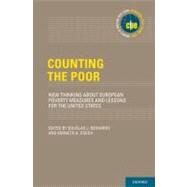Counting the Poor New Thinking About European Poverty Measures and Lessons for the United States
, by Besharov, Douglas J.; Couch, Kenneth A.- ISBN: 9780199860586 | 0199860580
- Cover: Hardcover
- Copyright: 6/15/2012
The poverty rate is one of the most visible ways in which nations measure the economic well-being of their low-income citizens. To gauge whether a person is poor, European states often focus on a person's relative position in the income distribution to measure poverty while the United States looks at a fixed-income threshold that represents a lower relative standing in the overall distribution to gauge. In Europe, low income is perceived as only one aspect of being socially excluded, so that examining other relative dimensions of family and individual welfare is important. This broad emphasis on relative measures of well-being that extend into non-pecuniary aspects of people's lives does not always imply that more people would ultimately be counted as poor. This is particularly true if one must be considered poor in multiple dimensions to be considered poor, in sharp contrast to the American emphasis on income as the sole dimension. With contributions from the world's foremost authorities on income and social measurement, the book provides detailed discussions of specific issues from a European perspective followed by commentary from American observers. The volume considers (1) current standards of poverty measurement in the European Union and the Organization for Economic Co-operation and Development, (2) challenges in extending those measures to account for the value of the provision of in-kind and cash benefits from the government, (3) the interaction of poverty measures with social assistance, (4) non-income but monetary measures of poverty, and (5) multi-dimensional measures of poverty. The result is a definitive reference for poverty researchers and policymakers seeking to disengage politics from measurement.






